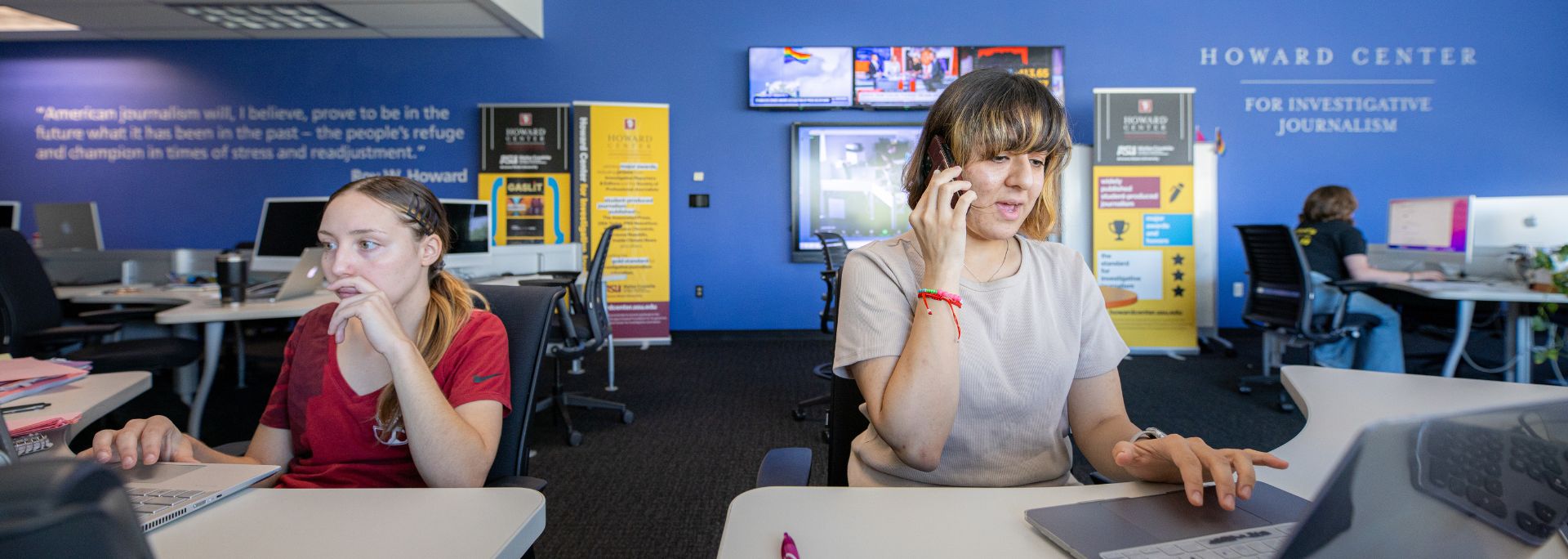
Cronkite School launches investigative editing certificate for working professionals
Investigative faculty of ASU's Walter Cronkite School of Journalism and Mass Communication and its Howard Center for Investigative Journalism have created a new investigative editing curriculum that will be offered online starting in January 2025.
The continuing professional education curriculum consists of 12 online learning modules that will allow learners to work through the course at their own pace. Each module will conclude with a live Zoom session, giving learners a chance to speak with Cronkite faculty who helped develop the curriculum.
Those include Pulitzer Prize winners Leonard Downie, Jr., the former executive editor of The Washington Post, Angela M. Hill, the Ida B. Wells professor of journalism at Cronkite, and Steve Doig, a Cronkite professor who is one of the pioneers in data journalism. Other award-winning faculty involved in developing the curriculum include Mark Greenblatt, executive director of the Howard Center, Lauren Mucciolo, the center's executive producer, and Maud Beelman, a veteran investigative editor who was the founding director of both the Howard Center at ASU and the International Consortium of Investigative Journalists.
"We are excited to launch this program, which will make the expertise of our faculty available to a broader audience and serve the needs of the investigative journalism community. The Howard Center for Investigative Journalism has established itself as an impactful unit, capable of producing exceptional journalism and collaborating at the highest levels throughout the industry. We have approached this endeavor with the same level of attention to detail that people have noted and come to expect from us," said Cronkite School Dean, Dr. Battinto L. Batts, Jr.
The curriculum covers every step of the investigative editing process, from helping to develop the best story ideas, to guiding data and visual investigations, to managing the unique opportunities and challenges of new technology, as well as the emotional stress that can sometimes be part of investigative journalism.
Whether you're a new or veteran editor "– or a reporter seeking to become an editor "– this curriculum will teach the best practices, tricks of the trade, and strategies for delivering important, impactful reporting in the most efficient way possible.
"There is a shortage of skilled investigative editors at a time of great need," said Beelman, the curriculum's creator. "Not only do the generations of young investigative reporters deserve experienced editors to guide their work, the world needs these journalists now more than ever to make sure the most important stories see the light of day."
The Howard Center for Investigative Journalism is a watchdog reporting lab for graduate and upper-level undergraduate students at the Walter Cronkite School of Journalism and Mass Communication at Arizona State University. Since 2019, the Howard Center has been training the future generation of investigative journalists, supported by grants from the Scripps Howard Foundation in honor of the late news pioneer Roy W. Howard.
In that time, the Howard Center has established a national reputation for traininig state-of-the-art investigators, as well as producing award-winning collaborative investigations with professional newsrooms. Talented Howard Center alumni are working in professional newsrooms around the world today.
Based on its success in training new investigative reporters, the Cronkite School decided to create a continuing professional education online opportunity to teach investigative editing skills to busy professionals. Online learners who complete all 12 courses will earn a certificate in investigative editing from the Cronkite School and its Howard Center, which can be used on resumes and social media profiles to indicate investigative expertise. The cost of the full program is $3,000. Learners also have the option of signing up for individual courses for $300 each, for which they'll receive a badge of completion.
Each course has a clear set of learning objectives and "– in the time period that it's offered "– can be taken at the learners' convenience. Two rounds of the 12-module course will be offered in 2025, from January to June and from July to December. The program includes videos with leading investigative journalists, tipsheets, readings and exercises to gauge mastery of the practices and concepts covered. A real-time chat will allow online learners in each course to communicate and trade notes with one another, and learners have the opportunity to finish the program with executable investigative ideas for their communities.
A small number of scholarships are available and will be given to those with financial needs or who serve underrepresented communities. Apply here.
For more information on this new investigative editing online curriculum from the Howard Center and the Cronkite School, or to register, please see https://www.careercatalyst.asu.edu/programs/investigative-editing/.
Development of the curriculum for The Howard Center for Investigative Journalism Editing Program is generously funded by the Scripps Howard Foundation.